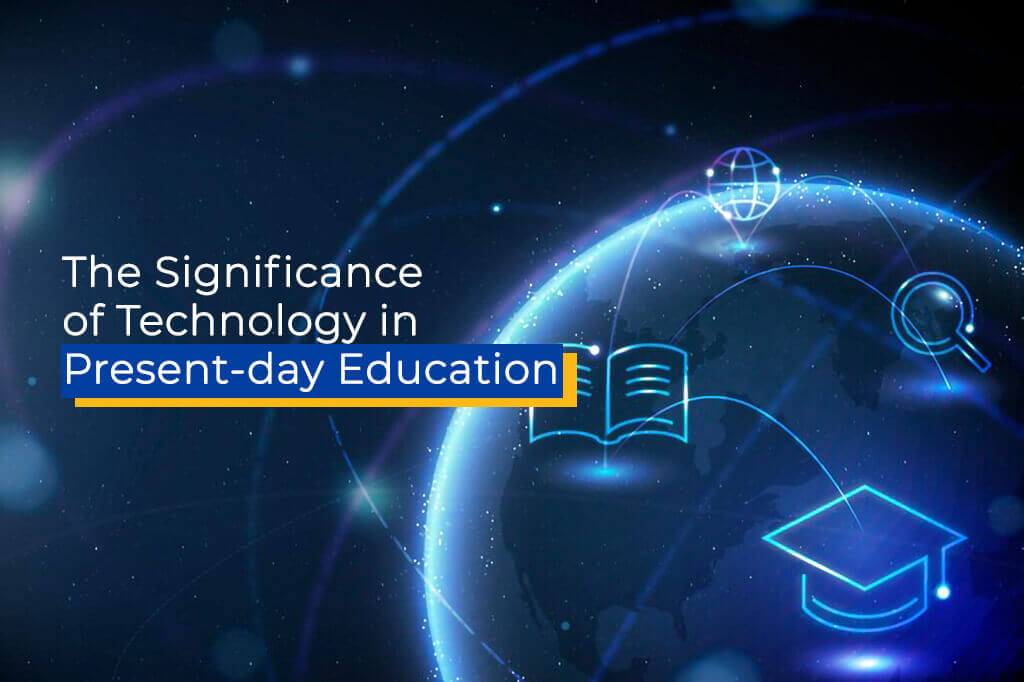The Significance of Technology in Present-day Education
These days, technology plays a significant role in the area of education, overseeing changes in how students learn, teachers transfer knowledge, and educational institutions run.
Technology has opened up new opportunities for educational experiences with the expanding availability of digital resources and internet-based learning platforms.
Students have access to a wealth of information, work together with classmates, and engage in interactive educational activities outside the traditional boundaries of the classroom.
Technology additionally encourages accessibility and inclusivity in the educational setting. It spans geographic gaps, giving distant students access to excellent learning materials.
Self-paced learning is made possible through online learning platforms, which can accommodate different learning preferences and styles. The assessment system has also undergone a transformation thanks to technology, with online tests and automatic grading systems providing learners with rapid feedback.
Technology at educational institutions streamlines administrative tasks in addition to enhancing the academic experience.
Digital technologies increase operational effectiveness by reducing the workloads of paperwork and physical labor, from handling attendance data to keeping student archives.
Technology also makes it easier for teachers, students, and parents to communicate and work together, promoting a more connected and active learning community.
Challenges Confronting Charter Schools in Managing Information Technology Infrastructure
While technology gives charter schools a number of benefits, managing the infrastructure for information technology creates challenging and complex issues.
Budget and resource constraints frequently provide obstacles, making it difficult to keep up with the swiftly advancing state of technology.
It can be difficult for educational institutions to keep up with the latest technology and software developments, which can lead to outdated systems that hinder optimal performance.
The need for effective cybersecurity protocols presents another challenge for charter schools.
Educational institutions must take the utmost precautions to protect their data and systems in considering the rising frequency of cyber threats.
Sadly, charter schools might not have the knowledge and resources necessary for the thorough deployment of cybersecurity safeguards, leaving them open to intrusions that compromise private student and employee data.
- NIST study on cybersecurity challenges faced by charter schools
- K12 Cybersecurity Resource Center study on cyberattacks on charter schools
- Ransomware attack on KIPP DC charter schools
- Data breach at Rocketship Education Charter schools
Furthermore, implementing technology into the curriculum successfully may provide difficulties for charter schools. To use educational technology to its fullest potential, educators may need training and direction. Technology adoption could be unpredictable and fail to produce the expected educational results in the absence of sufficient mentoring.
The Role of Managed IT Services in Mitigating IT Challenges for Charter Schools
The information technology problems affecting charter schools are addressed thoroughly by managed IT services.
Educational institutions can take advantage of the knowledge and experience of managed IT service providers by forming partnerships with them in order to expertly address these difficulties.
The proactive monitoring and upkeep of IT systems is one of the primary benefits of managed IT services.
These service providers keep a close eye on the network, servers, and equipment of the school, quickly spotting and fixing problems before they disrupt the learning environment.
This proactive approach makes sure there are as few downtimes as possible and as many uptimes as possible, enabling unbroken teaching and learning.
Managed IT service providers also offer strong cybersecurity solutions to protect charter schools from online dangers.
To strengthen the protection of sensitive data, they use firewalls, antivirus programs, and encryption techniques. To identify system flaws and swiftly address them, routine security audits and vulnerability assessments are carried out.
Additionally, managed IT service providers offer support and training to teachers to ensure that technology is properly incorporated into the curriculum.
They offer workshops, professional development opportunities, and an array of resources designed to equip teachers with the abilities and know-how necessary to make the best use of educational technologies. This support secures the extensive use of technology, enriching the instructional experience.
Key Features and Services Offered by Managed IT Service Providers
In order to meet the specific demands of charter schools, managed IT service providers offer a variety of features and services, including the following:
- Round-the-Clock Technical Support: Managed IT service providers extend continuous technical support to swiftly address any emergent IT issues, ensuring that educational institutions have immediate access to assistance when necessary.
- Data Backup and Recovery: Robust data backup and recovery Data Backup & Disaster Recovery solutions are implemented by managed IT service providers to shield against data loss, conducting periodic backups to guarantee the safety and recoverability of critical data in unforeseen exigencies.
- Network Security: Comprehensive network security measures are instituted by managed IT service providers to ward off cyber threats, comprising firewalls, intrusion detection systems, and periodic security appraisals to unearth and rectify vulnerabilities.
- Hardware and Software Management: The procurement, installation, and maintenance of hardware and software are meticulously handled by managed IT service providers, assuring that the educational institution’s technological infrastructure remains contemporary and functions optimally.
- Cloud Services: Managed IT service providers proffer cloud-based solutions that provide scalable and adaptable storage and computing resources, permitting educational institutions to harness the advantages of cloud technology without necessitating significant initial investments.
- Technology Planning and Consultation: Managed IT service providers collaborate closely with charter schools to craft technology plans that align with their educational aspirations. They deliver guidance and counsel on technology deployment, ensuring that educational institutions make well-informed decisions.
Implementation of Managed IT Services in Charter Schools
The implementation of managed IT services in charter schools mandates a methodical approach, guaranteeing a seamless transition and optimal benefit realization. The ensuing steps are worthy of consideration:
Assessment and Planning: Start by evaluating the school’s current IT infrastructure and identifying any areas that require improvement. Create a technological strategy that works with the academic goals and economic limits of the educational institution.
Vendor Selection: Exhaustively research and evaluate diverse managed IT service providers to pinpoint the one that best aligns with the school’s requisites. Pertinent factors to consider encompass experience, expertise, reputation, and pricing structures.
Integration and Transition: Work closely with the selected service provider to plan the shift from the current IT infrastructure to the world of managed IT services. Ensure that all systems are integrated seamlessly to limit disruptions to the instructional process.
Training and assistance: Provide educators and employees with further training and assistance to ensure their comfort using the newest technology systems. This process should be actively engaged by the managed IT service provider, who should also provide continuous support as needed.
Continuous Monitoring and Enhancement: Regularly assess the managed IT services’ performance and give the service provider feedback. This strategy encourages ongoing improvement and ensures that the services develop in line with the changing needs of the educational institution.
Guidelines for the Selection of the Optimal Managed IT Service Provider for Charter Schools
In the process of selecting a managed IT service provider, the following counsel should be heeded:
- Assess Experience: Investigate the track record of managed IT service providers that have specifically worked with charter schools. These providers possess an enhanced comprehension of the unique challenges and mandates of the educational sector.
- Evaluate Expertise: Determine the service provider’s experience in educational technology and whether they have a thorough understanding of the academic objectives of charter schools. They should be able to provide customized solutions that align with the educational objectives of the institution of higher learning.
- Request References: Ask the potential provider for references from other charter schools that have used their services. Insights into their performance history, client satisfaction levels, and success stories will be made available through this project.
- Consider Scalability: Opt for a service provider that can flexibly scale its services as the educational institution expands. They should be equipped to accommodate the evolving requisites and demands of the educational institution’s IT infrastructure.
- Scrutinize Security Measures: Given the paramount importance of cybersecurity, ascertain that the service provider has instituted robust security measures to safeguard sensitive data and systems. This encompasses routine security assessments and adherence to industry standards.
- Review Service Level Agreements (SLAs): Evaluate the SLAs that the managed IT service provider has provided in great detail. Assure compliance with the requirements set forth by the educational institution, including guarantees on response times, uptime, and support.
In Conclusion: The Future of Managed IT Services in Charter Schools
Charter schools could go through a transformation thanks to managed IT services since they would receive the necessary training, materials, and assistance to boost student accomplishment.
Charter schools can concentrate on their core objective of providing top-notch education by outsourcing their IT requirements.
In order to keep charter schools at the forefront of educational innovation, managed IT services will become more and more important as technology continues its march of growth.
Charter schools may quickly discuss the challenges of IT infrastructure management and harness the limitless potential of technology in education with the properly managed IT service provider as a committed companion.





